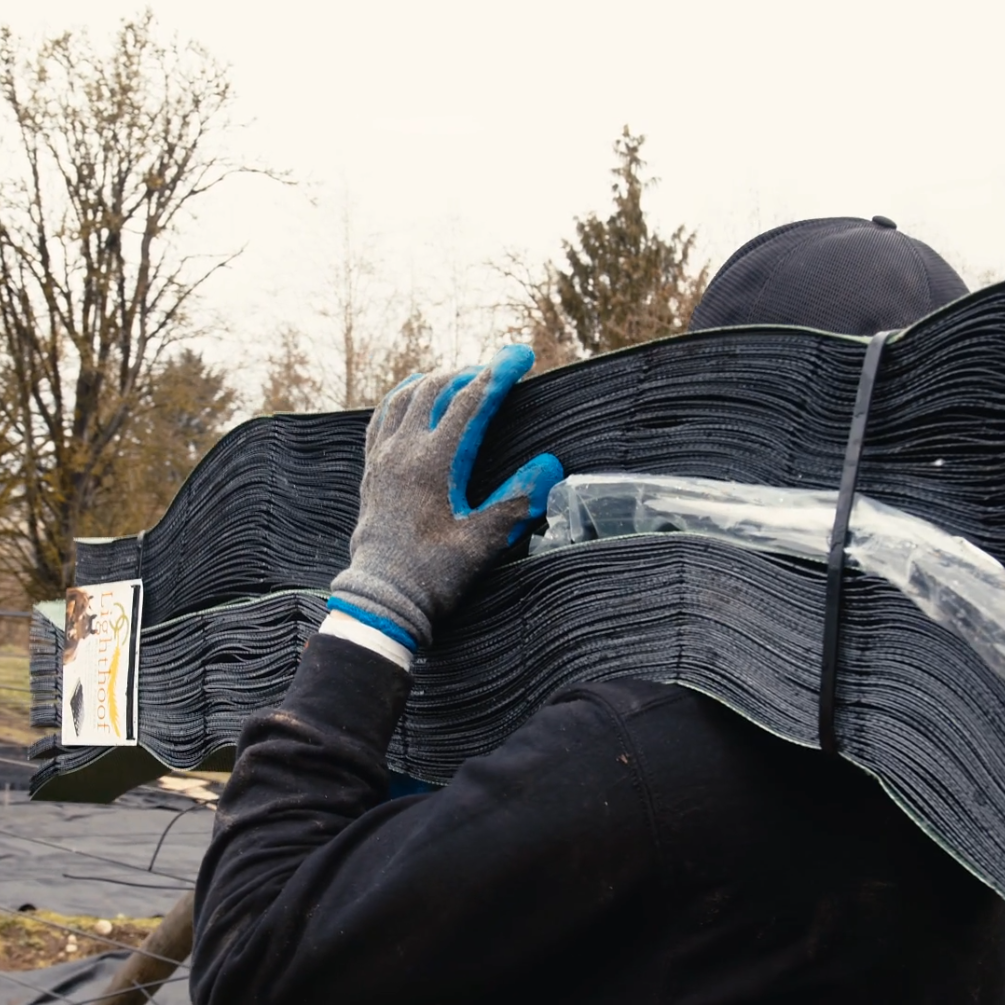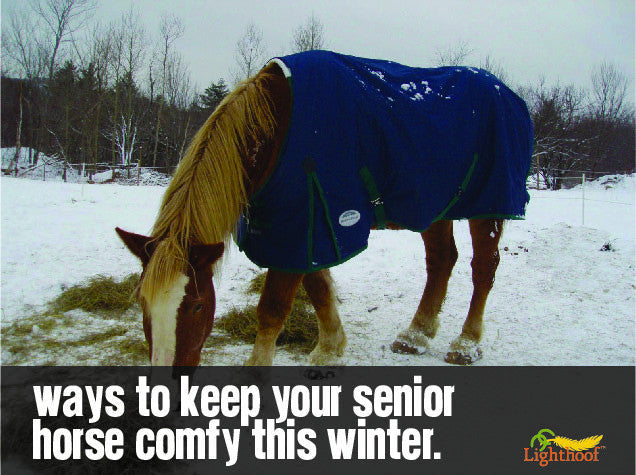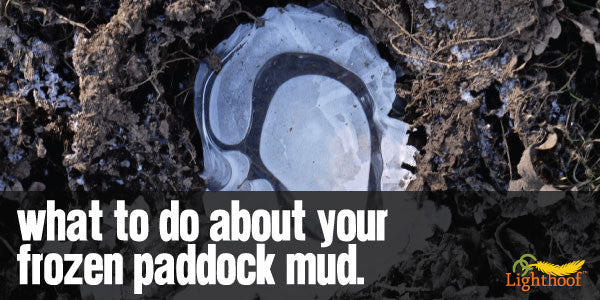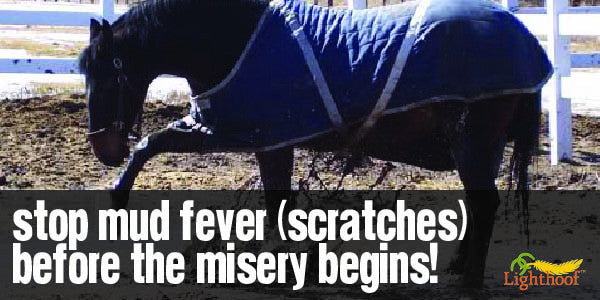As your equine companion ages, his ability to withstand winter weather diminishes. Stiff joints and muscles, metabolism changes, and even poor eyesight can make cold temperatures and wet weather hazardous to a horse who has reached (or passed!) his twenties. The good news is that just a few careful measures can ensure that your horse enjoys a happy, healthy season. Follow these winter horse care tips to keep your senior equine heathy all winter long!
1 - Ease his stiff, achy body
Arthritis and cold, damp weather can be a painful combination. Muscles are stiffer when they’re cold as well. Follow these guidelines to avoid cold-related soreness and injury:- When working your horse in winter, spend three to four times longer warming him up. After your ride, walk him longer as well. Use a cooler to encourage his body to cool safely and slowly.
- Your senior horse should always have shelter not just from rain and snow but from wind as well. A barn or stall with at least three full walls can make a difference in how he feels. Bed his stall deeper in the winter to give him a warm nest to lie in.
-
 Keeping your senior horse gently mobile becomes even more important in winter. Be sure he has all-day access to a paddock that is at least 20 feet wide and 80 feet long so that he can stretch his legs whenever he likes. He should have pals just over the fence or at least within view, but not inside the fence with him. Other horses in his paddock can cause him to spin or jump to get out of risky situations. That’s bad news on stiff joints and weak tendons!
Keeping your senior horse gently mobile becomes even more important in winter. Be sure he has all-day access to a paddock that is at least 20 feet wide and 80 feet long so that he can stretch his legs whenever he likes. He should have pals just over the fence or at least within view, but not inside the fence with him. Other horses in his paddock can cause him to spin or jump to get out of risky situations. That’s bad news on stiff joints and weak tendons! - To encourage your horse to move, spread his favorite things throughout the paddock. For example, put his hay, salt lick, water, toys, and grain all in different spots. This will keep even the laziest senior walking.
2 - Ensure that his environment is senior-safe
The aging process can make your horse vulnerable to environmental challenges in winter:- Slippery mud and ice are especially dangerous to your senior. He’s less agile and so more likely to slip and fall. What’s worse, he’s more prone to injury if he does have a spill. Keep his paddock dry and free of ice. If a slippery section does develop, use some extra fencing to block access to it.
- The whiteness of ice, snow, and frost can create hazardous glare for horses with cataracts or other vision impairments. If you can’t keep his area free from such dangers, consider keeping a fly mask on him during daylight hours.
- Horses with heaves and other respiratory problems can have an especially tough time in very cold temperatures. If he inhales icy air too quickly, your senior can irritate his lung tissue. Keep him in a warm stall on freezing nights. And don’t work him (or let other horses work him) hard when the temp is especially low.
3 - Maintain his body condition.
In cold weather, horses use food to stay warm. Calories are his friends! They generate body heat and (when not used) are stored as fat, which insulates your horse against the cold. If he doesn’t consume enough calories, your senior pal can get caught in a dangerous weight loss spiral. Older horses tend to be thinner, with less muscle and fat. If they can’t maintain body weight they become colder and use more energy to stay warm. This keeps them from building new layers of fat to insulate them. He also is more vulnerable to illness and less able to repair injured tissue. Keep the calories coming steadily:
If he doesn’t consume enough calories, your senior pal can get caught in a dangerous weight loss spiral. Older horses tend to be thinner, with less muscle and fat. If they can’t maintain body weight they become colder and use more energy to stay warm. This keeps them from building new layers of fat to insulate them. He also is more vulnerable to illness and less able to repair injured tissue. Keep the calories coming steadily:
- Hay metabolizes more slowly than grain and actually produces more heat. Feed your senior horse lots of hay during the day and also at night, when he needs warmth the most.
- Feed only high-quality hay. Older equines have difficulty digesting stemmy hay, making it essentially useless in helping them gain body condition or stay warm.
- Provide plenty of fat, a concentrated source of calories that won’t spike his blood sugar. Add vegetable oils to your horse’s grain or bran mash. Or even better, add a highly digestible fat supplement such as Cocosoya to his diet.
- Keep his mouth healthy. Chewing is a critical part of digestion! Have your vet check his teeth. Look for undigested hay in his manure, a sign of poor chewing. You may need to soak his hay or feed him chop or slurry.
Don’t go overboard and let your senior horse grow fat, however. Extra weight taxes old joints while too many sugars can create complications with metabolic diseases. Talk with your vet about your horse’s current weight and ideal diet.
4 - Keep his winter coat dry and healthy
To keep him warm, your senior’s coat should be dry and fluffy. Here are some smart practices to keep it that way:- Keep even the woolliest coat covered in wet winter weather. Even a rain sheet can make a big difference in warmth by keeping moisture away.
- Run your fingers through his coat at different times of the day to see if any sweat is building up under his blanket. Sweat from a warm day or exercise can be terribly chilling at night when the temperature drops. If you find sweat during the day only, switch to a lighter blanket or sheet in the day and change back to the heavy one at night.
- Be careful to thoroughly cool and dry your horse after your ride him. With a thick coat this can take ages, so schedule that in your day. Coolers and heat lamps can help evaporate the sweat off a horse. Or you may want to limit his workouts to long walks in winter time so that he doesn’t build up a sweat.
- Watch for puddles in his turnout blanket! Older horses with deep sway backs can collect water, which penetrates even the toughest blankets when it’s allowed to sit.
- Choose a blanket that is waterproof from its weave, not from a chemical treatment. Spraying or coating a blanket to waterproof it can keep it from wicking sweat off your horse. Don’t let your effort to protect him from the rain create a swampy coat from the inside.
- Give your aging horse access to shelter at all times. While a young horse might fare well in a pasture without shelter, our older friends aren’t as good at staying warm. Horses with woolly coats (from Cushings Disease or other causes) are more likely to suffer rain rot and skin infections.



 Keeping your senior horse gently mobile becomes even more important in winter. Be sure he has all-day access to a paddock that is at least 20 feet wide and 80 feet long so that he can stretch his legs whenever he likes. He should have pals just over the fence or at least within view, but not inside the fence with him. Other horses in his paddock can cause him to spin or jump to get out of risky situations. That’s bad news on stiff joints and weak tendons!
Keeping your senior horse gently mobile becomes even more important in winter. Be sure he has all-day access to a paddock that is at least 20 feet wide and 80 feet long so that he can stretch his legs whenever he likes. He should have pals just over the fence or at least within view, but not inside the fence with him. Other horses in his paddock can cause him to spin or jump to get out of risky situations. That’s bad news on stiff joints and weak tendons!

Leave a comment
This site is protected by hCaptcha and the hCaptcha Privacy Policy and Terms of Service apply.